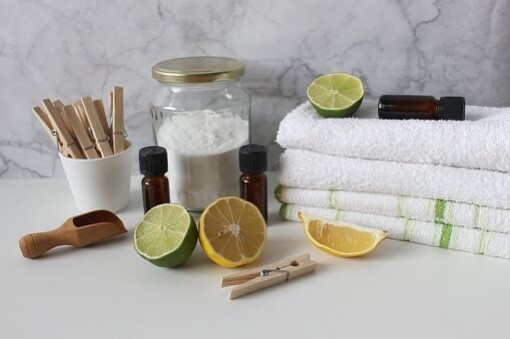
As we reflect on a year that tested our resilience, it's vital to find closure and peace with the experiences we endured. Closing the chapter on 2024 involves embracing gratitude and accomplishment while setting intentions for a brighter future. By decluttering both our physical and emotional spaces, we can clear the way for new energy and opportunities, ensuring we align our environment and mindset with the aspirations of the coming year.
The transition into 2025 presents a symbolic chance to reset and rebuild, much like the home renovations that offer tangible fresh starts. This period of change encourages careful financial planning, prioritizing savings and debt management, and aligning spending with long-term goals. Embracing small shifts in our daily habits, such as integrating Young Living essential oils into our routine, can promote stability and wellness, supporting both our mental and physical health.
Choosing a focus word to guide the year, rather than traditional resolutions, can provide clarity and purpose. Pairing this intention with the grounding practices of yoga and the nurturing power of love allows us to face the new year with confidence and resilience. As we rebuild, let 2025 be a canvas for growth, driven by incremental steps and fortified by the lessons of the past. Here's to a fulfilling new year ahead, crafted by intentional choices and a supportive community.
Sincerely,
Shannon
Read more...
Hello, I am sending you a snippet of my latest published blog. Follow to my website to engage in the experience;
The holiday season, often filled with hustle and busyness, can lead us to lose touch with the deeper meaning of Christmas. Essential oils, such as frankincense, myrrh, and cinnamon, offer a way to reconnect by creating a peaceful atmosphere and inspiring mindfulness. This guide explores how these time-honored oils can enhance your holiday experience and renew the true meaning of the season.
To cultivate a peaceful and relaxing environment amidst the holiday chaos, essential oils are an ideal solution. Frankincense, known for its grounding aroma, can promote calm and introspection when diffused during quiet evenings by the Christmas tree. Paired with myrrh, another oil with historical significance, the combination encourages reflection and meditation, helping you contemplate the true essence of the holidays.
Essential oils also bring the vibrant scents of Christmas into your home, enhancing the holiday atmosphere with their natural fragrances. Cinnamon oil, with its warm and spicy scent, evokes cozy gatherings and festive treats, making it perfect for diffusing or crafting homemade gifts. Incorporating these oils into your holiday traditions not only fosters a more mindful celebration but also connects you to the sacred roots of Christmas, enriching your family's experience and creating lasting memories.
Merry Christmas,
Sincerely,
Shannon

Hello,,, I am sending you personally a condensed version of my latest blog; head to my website and check out the whole blog and the amazing recipe I am sharing as well...
In the pursuit of a healthier lifestyle, gut wellness often takes center stage as it's intricately linked to overall health and well-being. Essential oils like peppermint, ginger, lemon, and digitize can be seamlessly integrated into daily routines to support digestive health. Along with these oils, simple health hacks such as a nutritious breakfast shake, maintaining hydration, and understanding the gut-brain connection are essential for nurturing gut health.
Peppermint essential oil is known for its soothing properties, providing digestive comfort by alleviating symptoms like bloating and indigestion. Adding a drop to water or tea can promote digestive ease, while diffusing it during meals creates a calming atmosphere. Similarly, ginger essential oil supports digestion, helps alleviate nausea, and when added to smoothies or a massage blend, it brings a sensation of vitality and relaxation.
Lemon essential oil offers a refreshing start to the day with its detoxifying properties, energizing morning drinks, and enhancing the cleanliness of your kitchen. For those seeking holistic wellness, digitize essential oil provides a blend that supports gut health through its calming aroma. Complementary practices such as consuming probiotics, maintaining hydration, and stress-reducing activities empower individuals to harmonize their gut health and overall well-being.
Sincerely,
Shannon
Read more...
In today's fast-paced world, especially for shift workers and healthcare professionals, maintaining a sense of control can drastically improve overall well-being. A sense of control refers to the feeling that you can influence the events and outcomes in your life, rather than being a passive participant. This perception is crucial for mental health, reducing stress and anxiety, and boosting overall balance.
To maintain a sense of control, consider setting clear goals, establishing routines, practicing mindfulness, delegating tasks, and prioritizing self-care. Setting both short-term and long-term goals helps you focus, while routines bring structure and predictability. Mindfulness allows you to accept things without judgment, and don't hesitate to say no to avoid feeling overwhelmed.
Using essential oils like lavender and peppermint can also assist in managing stress and enhancing focus. Lavender’s calming properties can help reduce anxiety, while peppermint’s invigorating aroma boosts concentration. By implementing these strategies and incorporating essential oils, you can better manage life's challenges and achieve a more balanced, fulfilling life.
In the whirlwind of today's fast-paced world, especially for healthcare professionals and shift workers, maintaining a sense of control can significantly enhance one's well-being. A sense of control is the perception that you can influence your life's events and outcomes, reducing stress and anxiety. This article outlines five strategies to uphold this sense of control: setting clear goals, establishing routines, practicing mindfulness, delegating tasks, and prioritizing self-care.
Setting clear goals helps provide a focused path, breaking down larger ambitions into manageable tasks for consistent progress. Establishing routines injects predictability and structure into daily life, enhancing your ability to plan and prioritize, even with shift work's challenges. Mindfulness invites you to embrace the present moment, reducing stress by accepting circumstances without trying to change them unnecessarily.
In addition to these strategies, essential oils like lavender and peppermint can be valuable allies. Lavender's calming properties help reduce stress, relaxing the mind for a more controlled state, while peppermint enhances focus and mental clarity, sustaining your efficiency in demanding environments. By integrating these tips and oils into your life, you can nurture a balanced and empowering sense of control, enriching your overall well-being.
Sincerely,
Shannon
Read more...
In the relentless rush of today’s workplace, whether you’re a healthcare hero, a night-shift warrior, or a cubicle conqueror, the humble break is often overlooked. Yet, it's one of your most powerful tools for maintaining wellness, sanity, and productivity. From brief pauses to disconnect from your digital overload to stepping outside for fresh air, optimizing your break time can transform your workday, health, and overall job satisfaction.
The Hidden Power of Taking Breaks
The science is clear: regular breaks can lead to significant improvements in cognitive performance and mental health. They reduce stress, increase creativity, and can even boost productivity by up to 13%. For healthcare workers and shift workers, who operate in environments where mental clarity and emotional resilience are paramount, breaks are not a luxury—they're a necessity.
However, encouraging a culture where breaks are prioritized requires effort, especially in workplaces that traditionally value non-stop productivity. Yet, the benefits far outweigh the challenges, offering a path to a healthier, happier, and more efficient team.
How to Optimize Your Break Time
Step Outside
The simplest activities are often the most effective. Just five minutes outside can decrease stress, improve mood, and enhance focus. Nature has a way of resetting our systems. For those in healthcare, where opportunities to leave are scarce, even a few moments next to a window looking outside can offer a mental reprieve.
Practice Mindfulness
Mindfulness can be practiced anywhere, anytime. Techniques like deep breathing, progressive muscle relaxation, or a quick meditative session can help clear your mind and relieve tension. Apps such as Headspace or Calm offer guided sessions that fit neatly into standard break times.
Stay Hydrated and Snack Smart
Hydration is crucial for maintaining energy levels and cognitive function. Pairing a water break with a healthy snack like fruits, nuts, or yogurt can help keep blood sugar levels stable and prevent the dreaded afternoon slump.
Socialize
Interacting with co-workers during breaks can strengthen team bonds and improve morale. A quick chat by the coffee machine or a shared lunch break offers a sense of camaraderie and support, especially beneficial in high-stress environments like hospitals or emergency services.
Physical Activity
Incorporating some form of physical activity into your break can invigorate your body and sharpen your mind. Simple stretching, a quick walk around the block, or a series of desk exercises can counteract the negative effects of prolonged sitting.
Encouraging Colleagues to Take Breaks
Leading by example is powerful. When managers and team leaders actively participate in break culture, it sends a clear message that breaks are valued and respected. Initiating group activities during breaks or setting up a comfortable break area can also encourage participation.
Open conversations about the importance of breaks and how they can improve workplace well-being and performance can help shift perceptions and build a more break-positive environment.
Conclusion
In an era where burnout is a genuine threat to workplace health and productivity, reevaluating the role of breaks in our daily work routine is critical. By optimizing and normalizing break time, not only can we enhance our own wellness and efficiency, but we can also foster a healthier, more supportive work environment for everyone.
Remember, taking regular breaks is not a sign of weakness; it’s a strategy employed by some of the most successful professionals to stay at the top of their game. So, the next time you feel overwhelmed or stuck in a rut, give yourself permission to pause. Your mind, body, and colleagues will thank you.





